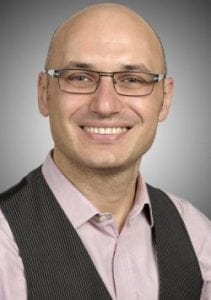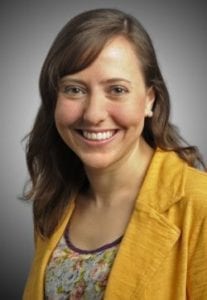College of Sciences Celebrates Founder’s Day Awardees
By ALLISON HURTADO ’12, SIMONE ROUSSEAU & ROBERT WELLS
Three College of Sciences faculty were recognized Wednesday with the University of Central Florida’s highest awards.
Physics Professor Joseph Harrington, Ph.D., was one of four new Pegasus Professors. Luca Argenti, Ph.D., and Jacquelyn “Jackie” Chini, Ph.D., were selected for the Reach for the Stars award, which recognizes early career professionals with highly successful research and creative activity with a national impact. Here are their profiles:
Joseph Harrington
Department of Physics, Florida Space Institute, College of Sciences
“Reach for the planets.”
Joseph Harrington is an internationally renowned planetary scientist and a key member of UCF’s Planetary Science Group. His research centers on exoplanets, or planets that orbit stars other than the sun. He also has an asteroid named after him: Joeharrington.
“Once I got here, the research group I founded made the first separate detection of day and night on an exoplanet and the first detection of disequilibrium chemistry on an exoplanet, which is a potential sign of life,” Harrington says. “We developed the methods we will use to detect life, once we have telescopes powerful enough to make the right measurements of planets that are hospitable to life.”
His work has been featured on the cover of the journal Science and has had several publications in Nature, bringing worldwide publicity for UCF. But his love for astronomy had humble beginnings.
“My grandmother couldn’t sleep. So she subscribed to an astronomy magazine and learned about the sky. She would take me out on the porch and point out the stars and planets,” Harrington says. “It was her energy and grasping of life that I really admired. My father is a nuclear engineer. I asked questions about everything, and he answered them all. He taught me all about protons, neutrons, fission, and fusion at a really young age. So now I’m a physicist and a planetary astronomer.”
He knew in sixth grade that he would get his doctorate and be an astronomer.
His teaching philosophy recognizes that students enter a competitive job field, and his goal is to put them at the top level.
“He is a dedicated teacher who has continually added to and developed a strong curriculum in the Planetary Science degree track in our Physics Ph.D. program,” says interim dean of the College of Sciences, Tosha Dupras. “His goal is to make it one of the best programs in the world, and that’s what he’s doing.”
The other Pegasus Professors are:
Ronald DeMara, Professor of Electrical and Computer Engineering, College of Engineering and Computer Science
Julia Listengarten, Director of Theatre UCF, Professor of Theatre, College of Arts and Humanities
Gregory Welch, AdventHealth Endowed Chair in Healthcare Simulation, College of Nursing
Also, honored Wednesday were Argenti and Chini:


Luca Argenti
Argenti is an expert in a new and emerging field of attosecond science that studies the fast motion of electrons in atoms and molecules at their natural time scale, with one attosecond being equal to one billionth of a billionth of a second.
The field was only recently made possible in the 21st century thanks to breakthroughs in scientific technology, and much of the research conducted in Europe.
“For more than a decade, Europe has maintained firm leadership of attosecond science in general. One of the few remarkable exceptions is physics and optics professor Zenghu Chang’s laboratory at UCF,” Argenti says. “It is in this context that, in 2016, I decided to take the opportunity of a joint opening at the Physics Department and CREOL to cross the pond and join UCF.”
Since then, Argenti has secured more than $1.5 million in research funds, and has been published in leading journals including Science, Nature Communications, and Physical Review Letters. He has received the highly competitive Department of Energy CAREER award as well as awards from the National Science Foundation.
Some of his most significant research contributions include the development of methods that allow the observation of new phenomena in the areas of high-resolution molecular photoelectron spectroscopy and attosecond electronic wave-packet dynamics in metastable atoms.
His goal is to ensure that UCF is the leader in attosecond science on this side of the Atlantic Ocean.
“Research projects within the attosecond community are at an exciting juncture, as each involve on average a dozen experimental and theoretical collaborators across nations,” Argenti says. “In these conditions, everyone can make a relevant contribution and has the chance to be part of a really international enterprise.
“If my research program is successful, it will be possible to predict beforehand the result of the interaction of an atom or molecule with a complex light pulse. As a result, we will be able to design sequences of ultrashort pulses that give us full control over charge-transfer processes in matter, such as those used by nature to harvest solar light and convert it to chemical energy.”
Chini perceives the challenges experienced by those living with disabilities when it comes to academic excellence, and she can’t stay silent about it. Her work within STEM discipline-based education research (DBER) addresses the gaps within her field regarding the education of diverse populations.
“I realized early in my teaching career that I did not have the skills and mindset needed to support the full variation in my students’ abilities, needs and interests,” she says. “I would like to see physics instructors become knowledgeable about methods to make their content accessible to all learners.”
The bulk of her research revolves around using simulation experiences as mechanisms for educators to practice implementing active learning strategies. Chini investigates the use of these mixed-reality classroom simulations in bringing graduate teaching assistants (GTAs) face to face with diverse students. Her hope is that these simulations address the challenges GTAs encounter when seeking to support diverse student populations.
On a global scale, her research articles have been featured in Physical Review Physics Education Research and she has organized national workshops and conferences including the Cottrell Scholars Collaborative National Teaching Assistant Workshop which took place in Atlanta last year.
Chini has earned about $2.26 million in sponsored funding to continue researching this diverse community and how best to usher them into the Physics Department through their educators. As a junior faculty with UCF since 2011, her work has time and time again reflected her ability to generate positive change both within the university and beyond.
The other Reach for the Stars winners are:
Kareem Ahmed, Assistant Professor of Mechanical and Aerospace Engineering, College of Engineering and Computer Science
Kelly Kibler, Assistant Professor of Water Resources Engineering, College of Engineering and Computer Science
